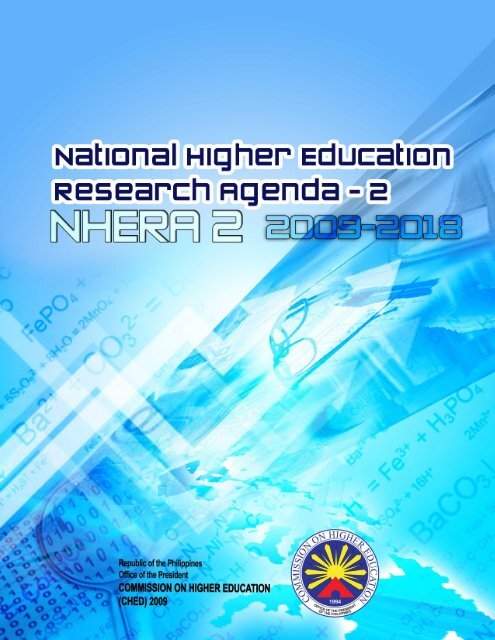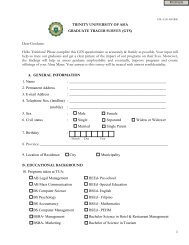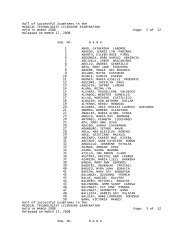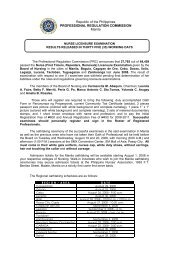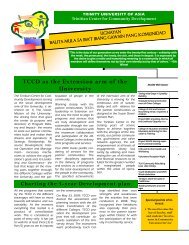national higher education research agenda - 2 (2009-2018)
national higher education research agenda - 2 (2009-2018)
national higher education research agenda - 2 (2009-2018)
Create successful ePaper yourself
Turn your PDF publications into a flip-book with our unique Google optimized e-Paper software.
FOREWORD<br />
Analysts of the knowledge society or knowledge economy characterize the<br />
university not just as a generator of knowledge, an educator of young minds and<br />
a transmitter of culture but also as a major agent of economic growth. It is both<br />
a Research and Development laboratory and a mechanism through which the<br />
nation builds its human capital to enable it to actively participate in the global<br />
economy.<br />
The UNESCO World Declaration on Higher Education for the Twenty-first Century<br />
acknowledges that “knowledge creation, transmission and application are the<br />
lifeblood of the knowledge-based economy” and <strong>higher</strong> <strong>education</strong> institutions<br />
are among the primary entities tasked “to generate, transmit, disseminate and<br />
apply knowledge.” They are thus a major component of the nation’s <strong>research</strong><br />
and innovation system. Moreover, from the perspective of <strong>education</strong>, vigorous<br />
and high quality <strong>research</strong> underpins and nourishes degree-level learning<br />
environments, especially for graduate and post-graduate programs; it provides<br />
the inquisitive, critical and independent regimen that develops intellectual<br />
capability and advances the boundaries of knowledge and understanding.<br />
The Commission on Higher Education is mandated to promote, direct and support<br />
<strong>higher</strong> <strong>education</strong> institutions in performing their <strong>research</strong> and instruction<br />
functions. With the objective of enabling our colleges and universities to produce<br />
high quality <strong>research</strong> that will advance learning and <strong>national</strong> development, as well<br />
as inter<strong>national</strong> comparability of the Philippine <strong>higher</strong> <strong>education</strong> system, the<br />
National Higher Education Research Agenda was developed by CHED and<br />
partner institutions/agencies.<br />
The NHERA provides the policies, directions, priorities and thrusts of Philippine<br />
<strong>higher</strong> <strong>education</strong> <strong>research</strong> in the medium to long term. Essentially, it encourages<br />
networking among HEIs, with each network focusing on themes wherein the<br />
members are or can be good at. It promotes partnerships/collaboration of HEIs<br />
with other <strong>research</strong> institutions, local and foreign, as well as with industry and<br />
private laboratories, for the conduct of <strong>research</strong>, and application of <strong>research</strong><br />
outputs.<br />
Commission on Higher Education<br />
i
NHERA also includes a system of incentives and rewards for outstanding<br />
performance in terms of:<br />
• Producing and creating leading edge knowledge;<br />
• applying that knowledge; and<br />
• disseminating that knowledge to students and the wider community.<br />
The first NHERA covered the period 1998-2008 including extension, this second<br />
NHERA or NHERA-2 will be for the period <strong>2009</strong>-<strong>2018</strong>. The initiatives under<br />
NHERA-1 to improve <strong>research</strong> capability and productivity among HEIs will be<br />
sustained and new challenges will be addressed under NHERA-2 so that <strong>higher</strong><br />
<strong>education</strong> <strong>research</strong> could create appreciable impacts not only across all disciplines<br />
of <strong>higher</strong> <strong>education</strong> but also in the more real-world socio-economic and cultural<br />
milieu.<br />
EMMANUEL Y. ANGELES<br />
Chairman<br />
ii<br />
Commission on Higher Education
INTRODUCTION<br />
Background and Rationale<br />
Research, as a major function in <strong>higher</strong> <strong>education</strong>, sets <strong>higher</strong> <strong>education</strong> apart<br />
from basic <strong>education</strong>. In the Bologna Ministerial Meeting of 2007 the world<br />
leaders in <strong>higher</strong> <strong>education</strong> explicitly stated: “The basis of <strong>research</strong> in <strong>higher</strong><br />
<strong>education</strong> is its independence and search for truth which justifies <strong>higher</strong> <strong>education</strong>’s<br />
continued exercise of academic freedom”. Furthermore, the UNESCO World<br />
Declaration on Higher Education for the Twenty-first Century accents the<br />
important role of <strong>research</strong> in <strong>higher</strong> <strong>education</strong> viz: “State policies must promote<br />
and develop <strong>research</strong>, which is a necessary feature of all <strong>higher</strong> <strong>education</strong> systems,<br />
in all disciplines, including the human and social sciences and arts, given their<br />
relevance for development”.<br />
Research in <strong>higher</strong> <strong>education</strong> across all disciplines ensures the continued growth<br />
and development of the entire <strong>higher</strong> <strong>education</strong> sector.<br />
In the Philippine context, Republic Act No. 7722 known as the “Higher Education<br />
Act of 1994” mandates the Commission on Higher Education to perform the<br />
following functions relative to <strong>research</strong> (Section 8, RA 7722):<br />
b) formulate and recommend development plans, policies, priorities and programs<br />
on <strong>research</strong>;<br />
...<br />
e) recommend to the executive and legislative branches, priorities and grants on<br />
<strong>higher</strong> <strong>education</strong> and <strong>research</strong>;<br />
...<br />
i) develop criteria for allocating additional resources such as <strong>research</strong> and program<br />
development grants, scholarships, and other similar programs; Provided, that<br />
these shall not detract from the fiscal autonomy already enjoyed by colleges and<br />
universities;<br />
...<br />
j) direct or redirect purposive <strong>research</strong> by institutions of <strong>higher</strong> learning to<br />
meet the needs of agro-industrialization and development;<br />
Commission on Higher Education<br />
iii
NHERA-1 (1998-2008)<br />
In line with the said mandates, the following goals for <strong>higher</strong> <strong>education</strong> <strong>research</strong><br />
were set for NHERA-I:<br />
• Push the frontiers of knowledge across all the identified <strong>higher</strong><br />
<strong>education</strong> disciplines in the country;<br />
• Enhance instruction through original contributions in specialized<br />
disciplines thereby encouraging students to become themselves<br />
creative, innovative and productive individuals; and<br />
• Develop unifying theories or models which can be translated<br />
into mature technologies for the purpose of improving the<br />
quality of life of the Filipinos within the sphere of influence of<br />
academic institutions in the country.<br />
Towards the attainment of these goals, nine priority clusters and 17 priority<br />
disciplines were identified, with special emphasis on <strong>research</strong>es that are<br />
multidisciplinary, leading edge scientific or technological, breakthrough or<br />
pioneering, and/or policy oriented. CHED supported the <strong>agenda</strong> with a budget<br />
allocation of P376M for a period of 10 years, specifically to provide:<br />
• Conducive policy environment for the management and<br />
administration of <strong>research</strong>;<br />
• technical assistance for <strong>research</strong>; and<br />
• funding/financial assistance for <strong>research</strong> in <strong>higher</strong> <strong>education</strong> in<br />
the form of block grants, grants-in-aid and commissioned<br />
<strong>research</strong>.<br />
Three years into the implementation of NHERA-1, the Zonal Research Center<br />
component was added. This involved the establishment of twelve ZRCs in <strong>higher</strong><br />
<strong>education</strong> institutions that are known for their strong <strong>research</strong> tradition and<br />
leadership. These ZRCs were tasked to help CHED in promoting <strong>research</strong> and<br />
building <strong>research</strong> capacity in the <strong>higher</strong> <strong>education</strong> institutions within the zones<br />
assigned to them and to bring closer to the HEIs the assistance necessary to<br />
strengthen their <strong>research</strong> function. Nine of these ZRCs operated for six years<br />
while three operated for three years.<br />
With the objective of facilitating the transfer and utilization of HEI <strong>research</strong><br />
outputs for development, the Commission decided in 2005 to include an<br />
Integrated Research Utilization Program in the NHERA. Under this program,<br />
iv<br />
Commission on Higher Education
funding assistance was provided for the transfer, utilization/commercialization<br />
of technologies developed by the HEIs.<br />
Other additions to NHERA-1 are three programs for recognizing and rewarding<br />
<strong>research</strong> productivity: the Research and Publication Award (REPUBLICA) which<br />
was launched in 2004, the Best Higher Education Institution Research Program<br />
Award which was initiated in 2005 and the Outstanding Higher Education<br />
Extension Program Award which was granted for the first time in 2008.<br />
At the end of NHERA-1, a Technical Working Group was created by CHED to<br />
review the Agenda and formulate its successor, NHERA-2, taking into<br />
consideration the new challenges and opportunities posed by the rapid<br />
developments in ICT, emergence of new fields like nanotechnology, globalization,<br />
and the knowledge-based economy.<br />
NHERA-2 (<strong>2009</strong>-<strong>2018</strong>)<br />
NHERA-2 restates the general policies that should guide <strong>higher</strong> <strong>education</strong> <strong>research</strong>,<br />
presents strategies and initiatives to develop <strong>research</strong> capacity and enhance <strong>research</strong><br />
productivity in <strong>higher</strong> <strong>education</strong> institutions, and identifies priority areas for<br />
<strong>research</strong> and <strong>research</strong>-related programs in the next ten years. It is a product of a<br />
series of roundtable discussions on the changing conditions of <strong>higher</strong> <strong>education</strong><br />
in the country and the state of <strong>research</strong> in Philippine colleges and universities. It<br />
incorporates the best thinking of <strong>national</strong> experts including institutional leaders,<br />
senior <strong>research</strong>ers and representatives from organizations that fund <strong>research</strong>.<br />
The Agenda is directed at three primary audiences, each playing a vital role in<br />
shaping Philippine <strong>higher</strong> <strong>education</strong> – state policy makers, institutional leaders,<br />
and <strong>research</strong>ers. It is designed to help them consider what types of <strong>research</strong><br />
would contribute most to <strong>national</strong> development and to the advancement of the<br />
disciplines, and hence, should be supported.<br />
NHERA is an evolving document and will thus be periodically reviewed and<br />
updated to respond to the changing times and needs of society.<br />
Commission on Higher Education<br />
v
ACRONYMS<br />
ASEAN<br />
CHED<br />
CHEDRO<br />
CMO<br />
COMSTE<br />
DBM<br />
DOH<br />
DOLE<br />
DOST<br />
EDCOM<br />
GIA<br />
HEI<br />
ICT<br />
IRUP<br />
JAS<br />
MOA<br />
NEDA<br />
NIBRA<br />
NUHRA<br />
NSTP<br />
OPPRI-RD<br />
R & D<br />
S & T<br />
SUC<br />
UNESCO<br />
ZRC<br />
- Association of South East Asian Nations<br />
- Commission on Higher Education<br />
- Commission on Higher Education Regional Office<br />
- CHED Memorandum Order<br />
- Congressional Commission on Science and Technology and<br />
Engineering<br />
- Department of Budget and Management<br />
- Department of Health<br />
- Department of Labor and Employment<br />
- Department of Science and Technology<br />
- Congressional Commission on Education<br />
- Grant-in-Aid<br />
- Higher Education Institution<br />
- Information & Communication Technology<br />
- Integrated Research Utilization Program<br />
- Journal Accreditation Service<br />
- Memorandum of Agreement<br />
- National Economic and Development Authority<br />
- National Integrated Basic Research Agenda<br />
- National Unified Health Research Agenda<br />
- National Service Training Program<br />
- Office of Policy, Planning, Research and Information-Research<br />
Division<br />
- Research and Development<br />
- Science and Technology<br />
- State University and College<br />
- United Nations Educational, Scientific and Cultural Organization<br />
- Zonal Research Center<br />
vi<br />
Commission on Higher Education
NATIONAL HIGHER EDUCATION RESEARCH<br />
AGENDA - 2 (<strong>2009</strong>-<strong>2018</strong>)<br />
General Principles on Higher Education Research<br />
Higher <strong>education</strong> <strong>research</strong> shall be guided by the following general principles:<br />
1. Research is the ultimate expression of an individual’s innovative and<br />
creative powers. The <strong>higher</strong> <strong>education</strong> sector shall ensure that the<br />
academic environment nurtures and supports Filipino <strong>research</strong><br />
talents.<br />
2. Research thrives in an environment characterized by free flow of<br />
information, honest and analytical exchange of ideas, and supportive<br />
policy and administrative structures. Higher <strong>education</strong> policies shall<br />
enhance the institution’s and the individual’s capacity to conduct<br />
independent, collaborative and productive <strong>research</strong>.<br />
3. Research is one of the main functions of the <strong>higher</strong> <strong>education</strong> sector.<br />
Universities in particular, are expected to lead in the conduct of<br />
discipline-based, policy-oriented, technology-directed and<br />
innovative/creative <strong>research</strong>es that are locally responsive and<br />
globally competitive.<br />
Goals and Objectives<br />
NHERA-2 shall support the <strong>higher</strong> <strong>education</strong> sector’s goals to develop high level<br />
and globally competitive workforce, generate/transfer knowledge and technology<br />
for enhancing productivity and quality of life in order to reduce poverty and ensure<br />
sustainable development in the country.<br />
The following objectives shall be pursued under NHERA-2:<br />
1. Improve <strong>research</strong> capability of HEIs, particularly the Philippine<br />
universities whose main business is to generate knowledge towards<br />
inter<strong>national</strong> competitiveness;<br />
2. Enhance <strong>research</strong> productivity of HEIs in distinctive areas of<br />
competence;<br />
Commission on Higher Education 1
National Higher Education Research Agenda 2 (<strong>2009</strong>-<strong>2018</strong>)<br />
3. Generate knowledge/technologies needed for<br />
a. Inter<strong>national</strong>, <strong>national</strong> and regional <strong>higher</strong> <strong>education</strong><br />
development,<br />
b. policy/plan formulation, particularly for <strong>higher</strong> <strong>education</strong><br />
c. developing innovative programs in cutting edge <strong>higher</strong><br />
<strong>education</strong> fields (e.g. nanotechnology, biotechnology,<br />
information and communications technology, and materials<br />
science); and<br />
d. advancing the frontiers of knowledge in the disciplines<br />
4. Promote and facilitate dissemination and utilization of <strong>research</strong><br />
outputs<br />
Agendum 1. Improving <strong>research</strong> capability of HEIs towards<br />
inter<strong>national</strong> competitiveness<br />
NHERA-1 began a massive <strong>research</strong> capability program for HEIs in the country.<br />
However, such capability building activities were focused on the more generic aspects<br />
of <strong>research</strong> which cut across all disciplines e.g. <strong>research</strong> methodologies, data analysis,<br />
proposal preparation and others. In order to address the peculiar requirements of<br />
each <strong>higher</strong> <strong>education</strong> discipline for <strong>research</strong>, NHERA-2 shall concentrate on<br />
<strong>research</strong> capability building by discipline.<br />
Strategies and initiatives for Agendum 1<br />
1. Research capability building programs. CHED shall provide funds<br />
to support graduate scholarships and fellowships, including but not<br />
limited to: thesis grants, dissertation grants, and travel grants for<br />
presentation of <strong>research</strong> papers in <strong>national</strong> and inter<strong>national</strong><br />
conferences. CHED shall likewise strengthen the Visiting<br />
Research Fellows Program in order to assist promising HEI’s in their<br />
quest for <strong>research</strong> excellence.<br />
2. Strengthening graduate <strong>education</strong> in priority disciplines. It is<br />
generally recognized that graduate <strong>education</strong> plays a critical role in<br />
producing the experts needed to revitalize <strong>research</strong> in the country<br />
as well as the bulk of <strong>research</strong> outputs needed for development,<br />
<strong>education</strong> and policy formulation. Hence, there is a need to strengthen<br />
graduate programs in priority disciplines. Promising HEIs with the<br />
capacity or reputation to undertake <strong>research</strong> on these disciplines<br />
shall be targeted for technical and financial assistance. The various<br />
Centers of Excellence shall also be tasked to perform leadership<br />
roles in providing strong graduate programs in these disciplines.<br />
2
Agendum 2. Enhancing <strong>research</strong> productivity of HEIs<br />
Analysis of the <strong>research</strong> productivity (in terms of the publications of <strong>higher</strong><br />
<strong>education</strong> faculty) of HEIs shows that the implementation of NHERA-1 resulted<br />
in roughly 33% increase in faculty publications benchmarked from the EDCOM<br />
(1993) report. However, most of the publications were concentrated in the “soft<br />
sciences”. NHERA-2 will increase <strong>research</strong> productivity in every <strong>higher</strong> <strong>education</strong><br />
discipline and improve <strong>research</strong> to faculty ratio.<br />
Strategies and initiatives for Agendum 2<br />
1. Funding <strong>research</strong> in and on <strong>higher</strong> <strong>education</strong>. CHED shall<br />
provide funding for the conduct of <strong>research</strong> in identified priorities.<br />
Funding shall be in the form of Grants-in-Aid or commissioned<br />
<strong>research</strong> grant.<br />
Grants-in-Aid shall be made available to <strong>research</strong>ers in both public<br />
and private <strong>higher</strong> <strong>education</strong> institutions who can and want to do<br />
<strong>research</strong> on the priority areas.<br />
Commissioned <strong>research</strong> grants shall be available for specific topics<br />
or issues/ problems which the Commission deems important in<br />
the pursuit of its mandates.<br />
2. Institutionalization of a system of rewards and incentives for<br />
<strong>research</strong> undertakings and outputs of HEI faculty and<br />
<strong>research</strong>ers. In order to encourage faculty and institutions to<br />
conduct and invest in <strong>research</strong>, the Commission shall adopt a system<br />
of recognizing outstanding <strong>research</strong>ers and outstanding <strong>research</strong><br />
programs and outputs. Excellence in <strong>research</strong> shall be recognized<br />
through various awards and other incentives, including, but not<br />
limited to: REPUBLICA, Best HEI Research Program Awards,<br />
Outstanding HEI Extension Program Awards, and professorial<br />
chairs in public or private institutions.<br />
Commission on Higher Education 3
National Higher Education Research Agenda 2 (<strong>2009</strong>-<strong>2018</strong>)<br />
3. Journal Accreditation Service. A system of accreditation of<br />
<strong>research</strong> journals shall be established to ensure adoption of fair and<br />
impartial refereeing system for all <strong>research</strong> journals in <strong>higher</strong><br />
<strong>education</strong> in the country. The JAS shall serve as a mechanism through<br />
which a <strong>national</strong> standard for peer review and journal refereeing<br />
system can be implemented uniformly for all <strong>research</strong> journals<br />
published by the Philippine HEIs and other professional<br />
organizations.<br />
Agendum 3. Generating new knowledge needed for the<br />
advancement of <strong>higher</strong> <strong>education</strong> as well as for <strong>national</strong><br />
development<br />
Under NHERA-1, studies were commissioned to generate knowledge needed to<br />
improve policies and the implementation and administration of <strong>higher</strong> <strong>education</strong><br />
in the country. These focused mostly on the rationalization of the <strong>higher</strong> <strong>education</strong><br />
system and on addressing the manpower demand-supply mismatch. At the same<br />
time, GIAs were provided for <strong>research</strong> in aid of <strong>national</strong> and regional thrusts,<br />
particularly biodiversity and environmental management, human resource<br />
development, agriculture and agri-based micro-small-medium scale enterprises,<br />
tourism, ICT-related concerns, and others.<br />
Under NHERA-2, the <strong>higher</strong> educacation sector will continue to work in tandem<br />
with the science and technology, industry, agriculture, energy and other sectors to<br />
address the <strong>research</strong> priorities for development. Greater attention shall, however,<br />
be accorded to the studies that would generate inputs for the formulation of<br />
policies, plans, programs and projects, and produce/adapt technologies for<br />
enhancing quality, relevance, access and equity, and efficiency and effectiveness in<br />
<strong>higher</strong> <strong>education</strong>.<br />
In addition, priority shall be given to <strong>research</strong> aimed at developing innovative<br />
programs in cutting edge <strong>higher</strong> <strong>education</strong> fields (e.g. nanotechnology,<br />
biotechnology, information and communications technology, and materials science),<br />
and advancing the frontiers of knowledge in the disciplines.<br />
NHERA-2 aims to place Philippine <strong>higher</strong> <strong>education</strong> in the inter<strong>national</strong> <strong>research</strong><br />
community through awards and recognition of Filipino <strong>research</strong>ers in cutting edge<br />
disciplines as well as in other priority disciplines.<br />
4
Strategies and initiatives for Agendum 3<br />
1. Dovetailing <strong>higher</strong> <strong>education</strong> <strong>research</strong> with R & D initiatives<br />
of the Department of Science and Technology and other donor/<br />
<strong>research</strong> agencies. CHED and <strong>higher</strong> <strong>education</strong> institutions are<br />
part of the National Innovation System which comprises a number<br />
of R & D funding and implementing entities. The <strong>higher</strong> <strong>education</strong><br />
sector’s <strong>research</strong> program should thus complement and be in<br />
harmony with the R & D efforts of the other members of the<br />
<strong>national</strong> innovation system -- DOST, Department of Agriculture,<br />
Department of Energy, Department of Environment and<br />
Natural Resources, Congressional Commission on Science and<br />
Technology and Engineering, and others.<br />
2. Networking. Networks or consortia shall be formed between and<br />
among <strong>higher</strong> <strong>education</strong> institutions with <strong>research</strong> expertise in<br />
identified priority themes/ disciplines, to pool resources of the<br />
better institutions and allow sharing of these resources for<br />
<strong>research</strong> capability building and conduct of <strong>research</strong>. The nodes<br />
of the networks shall be Centers of Excellence/Centers of<br />
Development, Autonomous HEIs and institutions with Level II-<br />
IV accredited programs in the priority discipline.<br />
3. Establishment of zonal <strong>research</strong> laboratories with state-of-theart<br />
facilities and equipment for cutting edge technology <strong>research</strong>.<br />
4. Visiting scholars and fellowship program. CHED shall continue<br />
to promote the Visiting Research Fellowship Program in order to<br />
provide participating HEIs with the needed high level expertise<br />
to establish and develop the culture of <strong>research</strong> in these institutions.<br />
Commission on Higher Education 5
National Higher Education Research Agenda 2 (<strong>2009</strong>-<strong>2018</strong>)<br />
Agendum 4. Promoting and facilitating dissemination and<br />
utilization of <strong>research</strong> outputs<br />
With CHED support, faculty <strong>research</strong>ers were able to present their <strong>research</strong> outputs<br />
in inter<strong>national</strong> conferences/fora during the last four years of NHERA-1. National<br />
and inter<strong>national</strong> <strong>research</strong> conferences were also organized and hosted by CHED<br />
and partner institutions/organizations.<br />
The Integrated Research Utilization Programs which were introduced in 2005<br />
enabled SUCs to utilize technologies that they had developed for their own Income<br />
Generating Projects or transfer these to end-users for livelihood and employment<br />
generation. Their technology transfer activities gave rise to livelihood projects that<br />
provided employment for breadwinners in their host communities.<br />
Information dissemination activities will be expanded under NHERA-2 in<br />
anticipation of increased <strong>research</strong> productivity among HEIs. Support shall also be<br />
provided for the publication of <strong>research</strong> papers in refereed journals. The IRUP<br />
will be sustained with focus on utilization of <strong>research</strong> outputs for income generating<br />
projects that will help SUCs generate more funds to be funneled back to <strong>research</strong><br />
and instruction.<br />
Strategies and initiatives for Agendum 4<br />
1. Supporting dissemination of <strong>research</strong> outputs. Cognizant of the<br />
need to make <strong>research</strong> results known and disseminated worldwide,<br />
CHED shall provide financial support for the conduct of and<br />
participation in dissemination activities such as <strong>research</strong> fora, seminars<br />
and conferences, and for publication in/of refereed <strong>research</strong> journals<br />
in various disciplines.<br />
2. Research utilization and technology commercialization<br />
programs. CHED shall continue to support initiatives of HEIs in<br />
utilizing the technologies generated by their <strong>research</strong>ers for their<br />
own Income Generating Projects or in transferring these to endusers<br />
for commercialization and productivity enhancement.<br />
6
PRIORITY RESEARCH AREAS /THEMES<br />
Principles guiding prioritization<br />
The NHERA integrates the concerns of <strong>higher</strong> <strong>education</strong> sector with the overall<br />
development goals and objectives of the country, the National Innovation System<br />
and the <strong>higher</strong> <strong>education</strong> inter<strong>national</strong> community.<br />
In formulating the NHERA, the Commission was guided by the following principles:<br />
1. Multidisciplinarity. Researches that involve the expertise of<br />
<strong>research</strong>ers in several disciplines are preferred over <strong>research</strong>es<br />
needing the expertise in a single discipline. This principle shall,<br />
however, not apply to the category of “breakthrough <strong>research</strong>es”<br />
such as revolutionary scientific or mathematical discoveries.<br />
2. Policy orientation. Policy-oriented <strong>research</strong>es are preferred over<br />
<strong>research</strong>es that have little or no policy implication across the various<br />
<strong>higher</strong> <strong>education</strong> disciplines.<br />
3. Participation and networking. The <strong>research</strong> should involve the<br />
participation of as many stakeholders as possible and should be<br />
organized preferably as network, instead of stand alone, undertaking<br />
of an HEI or individual <strong>research</strong>er.<br />
4. Balanced attention to basic and applied <strong>research</strong>. Both basic or<br />
pure <strong>research</strong> and applied <strong>research</strong> shall be given due importance.<br />
5. Dovetailing and complementation with other R & D initiatives.<br />
In order to ensure complementation and avoid duplication of<br />
<strong>research</strong> initiatives, CHED shall coordinate closely with the DOST<br />
and other funding institutions in the evaluation, monitoring and<br />
programming of <strong>research</strong> in HEIs.<br />
Research priorities<br />
Guided by the above principles there are several categories of <strong>research</strong> undertakings<br />
that require and shall be given consideration:<br />
1. Basic <strong>research</strong> to generate new knowledge and advance the frontiers<br />
in the various disciplines;<br />
Commission on Higher Education 7
National Higher Education Research Agenda 2 (<strong>2009</strong>-<strong>2018</strong>)<br />
2. Research in aid of policy/plan formulation and implementation<br />
particularly in <strong>education</strong><br />
3. Research aimed at producing/adapting <strong>education</strong> technologies<br />
and developing <strong>education</strong> programs in cutting edge fields such<br />
as nanotechnology, biotechnology, ICT, materials science, etc.<br />
4. R & D in aid of <strong>national</strong>/regional development<br />
Priority discipline clusters<br />
Consistent with the Medium term Plan for the Development of Higher Education 2005-<br />
2010 and the New Higher Education Highway Toward a Knowledge-based Economy, <strong>research</strong><br />
shall be encouraged in the following clusters of disciplines:<br />
Science and Mathematics<br />
Education and Teacher Training<br />
Health and health profession<br />
Information and Communication Technology<br />
Engineering, Maritime and Architecture<br />
Agriculture<br />
Environmental Science<br />
Humanities<br />
Social Sciences<br />
Other disciplines as identified by the Commission<br />
The Technical Working Group on Research and the various Technical Panels of<br />
CHED shall periodically review the state of the art in their respective disciplines,<br />
identify knowledge gaps and recommend priority areas for <strong>research</strong> in the disciplines.<br />
The recommended priority <strong>research</strong> areas shall be circulated periodically through<br />
CHED Memorandum Orders.<br />
8
Priority Research Areas in Education and Education<br />
Management<br />
1. Program/curricular studies on <strong>higher</strong> <strong>education</strong> – including<br />
assessment of present programs/curricula for purposes of<br />
determining how these could be improved/reengineered as well<br />
as inter<strong>national</strong> benchmarking of best practices towards the<br />
development of new programs/curricula in leading edge disciplines<br />
2. Policy oriented studies – <strong>research</strong> on the various dimensions of<br />
policy formulation, implementation, monitoring and e valuation<br />
focusing on but not limited to the following:<br />
a. financing of <strong>higher</strong> <strong>education</strong>; cost sharing in <strong>higher</strong> <strong>education</strong><br />
b. economics of <strong>higher</strong> <strong>education</strong>,<br />
c. governance and management of <strong>higher</strong> <strong>education</strong>,<br />
d. accreditation and other quality assurance mechanisms,<br />
e. rationalization of <strong>higher</strong> <strong>education</strong>,<br />
f. inter<strong>national</strong>ization of <strong>higher</strong> <strong>education</strong><br />
g. access and equity measures<br />
h. student financing models<br />
3. Research on quality and standards in the context of:<br />
a. inter<strong>national</strong> rankings and global benchmarking<br />
b. quality assurance systems<br />
c. equivalency<br />
d. redefining classifications of HEIs<br />
4. Technology and <strong>education</strong><br />
5. Model building studies<br />
6. Institutional development studies<br />
7. Manpower demand and supply studies<br />
8. Graduate tracer studies<br />
9. Other <strong>research</strong> topics considered by the Commission in response<br />
to emerging needs of the country<br />
Commission on Higher Education 9
National Higher Education Research Agenda 2 (<strong>2009</strong>-<strong>2018</strong>)<br />
Higher <strong>education</strong> <strong>research</strong> in support of R & D initiatives of other<br />
agencies/sectors<br />
The <strong>higher</strong> <strong>education</strong> sector is part of the National Innovation System that generates<br />
and mobilizes knowledge for enhancing productivity and addressing the goals of<br />
<strong>national</strong> development. As such, CHED and the HEIs are expected not only to<br />
produce <strong>research</strong> and development manpower but also to actively participate in<br />
the implementation of the R & D plans for Science and Technology, Health, Energy,<br />
Agriculture and other sectors that are identified as priority in the National<br />
Development Plan.<br />
Hence NHERA-2 supports and complements the following:<br />
1. National Science and Technology Plan (NSTP) 2002-2020.<br />
The S & T area thrusts of the NSTP are:<br />
a. Agriculture, Forestry and Natural Resources<br />
b. Health and Medical Sciences<br />
c. Biotechnology<br />
d. Information and Communication Technology<br />
e. Microelectronics<br />
f. Earth and Marine Sciences<br />
g. Fisheries and Aquaculture<br />
h. Environment<br />
i. Natural Disaster Mitigation<br />
j. Energy<br />
k. Materials Science and Engineering<br />
l. Manufacturing and process engineering<br />
2. National Integrated Basic Research Agenda. NIBRA specifies<br />
the areas of priority that will be the focus of basic <strong>research</strong> up to<br />
2010. The priorities identified in NIBRA are consistent with the<br />
NSTP; in addition, these include areas/ topics devoted to<br />
policy, government, <strong>education</strong> and inter<strong>national</strong> affairs, social<br />
sciences and the humanities. The main benefits of basic <strong>research</strong><br />
results are “the advancement of frontiers in the discipline itself ”.<br />
3. National Unified Health Research Agenda 2008-2010.<br />
NUHRA specifies the areas and topics that need to be addressed in<br />
10
line with the global and <strong>national</strong> initiatives influencing the health<br />
sector. Priority <strong>research</strong> topics are classified into major areas, namely,<br />
health financing, governance, health regulations, health service<br />
delivery, health technology development, health <strong>research</strong> ethics, and<br />
health information system.<br />
4. Recommendations of the Congressional Commission on Science<br />
and Technology and Engineering. R & D priorities identified by<br />
COMSTE are in six key areas, namely, agriculture and<br />
food, electronics and semi conductors, energy and environment,<br />
health science, IT and IT-related industries, and science, mathematics<br />
and engineering <strong>education</strong>.<br />
Priority themes for multidisciplinary/multisectoral <strong>research</strong><br />
In light of the realities that the country is now experiencing and will face in the<br />
future, <strong>research</strong> on the following themes shall be encouraged:<br />
1. Food safety and security. Considering the country’s prone-ness<br />
to natural hazards and disasters and with its booming<br />
population, it is important for the people to be assured of<br />
affordable and safe food on their table.<br />
2. Enhancing indigenous renewable energy source in the domestic<br />
energy mix. Increasing the percentage of indigenous renewable<br />
energy source into the <strong>national</strong> energy mix will not only result in<br />
dollar saving, and protection of the environment but more<br />
importantly, ensuring energy security. The search, development and<br />
exploitation of renewable energy sources will involve a multidisciplinary<br />
approach.<br />
3. Development of vaccines and diagnostic kits using indigenous<br />
materials. Emerging and reemerging diseases have always<br />
threatened the global and regional scenes. The country has to be<br />
prepared for these by having the appropriate medication, vaccines<br />
and diagnostic kits that are readily available and affordable.<br />
Commission on Higher Education 11
National Higher Education Research Agenda 2 (<strong>2009</strong>-<strong>2018</strong>)<br />
4. Disaster risk management. The shift from preparedness to<br />
prevention and mitigation mode in our disaster risk management<br />
framework would entail a lot of <strong>research</strong> work not only in policy<br />
formulation, community development, and public awareness but<br />
also in hard science (e.g. forecasting, structural engineering aspects).<br />
5. Pollution control. Environmental issues that affect the land, air<br />
and water should be studied. A developing country like the<br />
Philippines must ensure that progress is not compromised by<br />
environmental degradation.<br />
6. Climate change specifically on the issue of global warming. The<br />
four pillars of the Bali Action Plan dealing with a) mitigation,<br />
b) adaptation, c) technology transfer, and d) financial resources are<br />
rich sources of multi disciplinary <strong>research</strong> work. Considering that<br />
climate change issues deal with future scenarios, a wholistic approach<br />
is necessary.<br />
7. Future ASEAN. The ASEAN Charter has come into force and by<br />
AY 2015, we will be a single community. The ASEAN will also<br />
have its own legal personality. In the process, immediate studies on<br />
how to handle this pending reality must be done.<br />
8. Peace process and conflict resolution. This is a rich source of<br />
<strong>research</strong> work, the results of which can be applied to governance,<br />
policies and direction setting.<br />
12
National Higher Education Research Agenda 2 (<strong>2009</strong>-<strong>2018</strong>)<br />
GUIDELINES FOR AVAILMENT OF CHED GRANTS AND<br />
AWARDS<br />
Research grants<br />
In the implementation of the National Higher Education Research Agenda-2<br />
CHED shall provide five types of funding assistance:<br />
1. Grants-in-Aid (GIA) – grants for <strong>research</strong>es that fall within the <strong>national</strong> or<br />
zonal priorities/<strong>agenda</strong> identified by CHED. Priority is given to <strong>research</strong><br />
proposals submitted by HEIs. Proposals for GIA are processed by Zonal<br />
Research Centers identified by the Commission, in cooperation with the<br />
OPPRI - Research Division.<br />
2. Commissioned <strong>research</strong> – grants awarded to institutions/individuals with<br />
proven track record in <strong>research</strong> based on the topics/issues/problems<br />
identified by the Commission as important/vital to the pursuit of its<br />
mandates. Proposals for commissioned <strong>research</strong> are processed by the<br />
OPPRI-Research Division.<br />
3. Visiting Research Fellowships – grants awarded to outstanding <strong>research</strong><br />
professors in HEIs across various disciplines in recognition of their<br />
significant contributions and outputs in the academic and <strong>research</strong><br />
community. Proposals for Visiting Research Fellowship are processed by<br />
the OPPRI-Research Division.<br />
4. Research Professorial Chairs. Outstanding <strong>research</strong> professors in <strong>higher</strong><br />
<strong>education</strong> institutions shall be given recognition through grants of Research<br />
Professorial Chairs. The title of Research Professor remains with the<br />
Professor for as long as he/she remains actively engaged in CHEDfunded<br />
<strong>research</strong>. The results of his <strong>research</strong> will be published in JAS<br />
accredited journal. Search and selection shall be done at the OPPRI-RD.<br />
5. Thesis/Dissertation Grants – grants awarded to deserving faculty to support<br />
and enable them to do their thesis/dissertation and earn their master/<br />
PhD degree from Centers of Development/Centers of Excellence.<br />
The detailed procedures are described in CMO 32, s. 2008; CMO 38, s.<br />
2008; CMO 13, s. <strong>2009</strong>; and CMO 10, s. <strong>2009</strong>. ( see www.ched.gov.ph)<br />
16
Criteria for evaluating <strong>research</strong> proposals<br />
The Proposal<br />
a. The proposal corresponds with one or more of the listed <strong>research</strong><br />
priorities;<br />
b. The <strong>research</strong> proposal is relevant to the problems and needs in the<br />
local/<strong>national</strong> setting in the case of applied <strong>research</strong>;<br />
c. The methodology of the study is justified and sound;<br />
1) Well-selected variables<br />
2) Clarity of the objectives/problems<br />
3) Appropriateness of methodologies<br />
4) Comprehensiveness of the review/scanning of literature and<br />
empirical studies<br />
d. The proposal’s expected outputs, impacts and derivations are<br />
clear and well-defined;<br />
e. The work plan includes a description of each activity in the study<br />
including date of completion; and<br />
f. The financial plan and budgetary outlay are adequate and present<br />
an itemized breakdown of the total project costs and source/s of<br />
funds.<br />
The Proponent<br />
The proponent has the track record/competence to carry out the proposed<br />
<strong>research</strong>:<br />
a) Academic qualification<br />
b) Research experience in his field of specialization<br />
Commission on Higher Education 17
National Higher Education Research Agenda 2 (<strong>2009</strong>-<strong>2018</strong>)<br />
2.<br />
18
Commission on Higher Education 19
20<br />
National Higher Education Research Agenda 2 (<strong>2009</strong>-<strong>2018</strong>)
Commission on Higher Education 21


